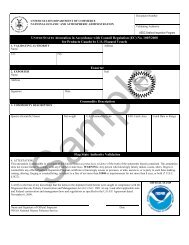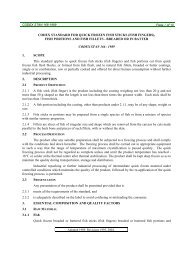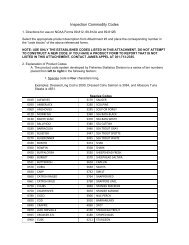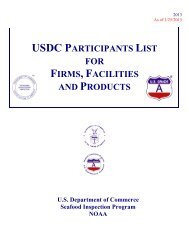Customs Labeling - Seafood Inspection Program
Customs Labeling - Seafood Inspection Program
Customs Labeling - Seafood Inspection Program
Create successful ePaper yourself
Turn your PDF publications into a flip-book with our unique Google optimized e-Paper software.
factor to consider. We note that peeling and deveining is often performed by many consumers in their<br />
own kitchens.<br />
We are not persuaded by the argument that the processing changes the use of the imported<br />
product since peeled shrimp cannot be utilized for any of the shell-on presentations, e.g., "boil and<br />
peel", and "tail-on cocktail" dishes. Although the peeling may limit some of the uses of the imported<br />
product, this limitation does not equate with substantial transformation. In each of the cases cited<br />
above, where the U.S. processing did not effect a substantial transformation, the processed product<br />
could no longer be used for certain presentations. For example, after water was added to the orange<br />
juice concentrate it could no longer be sold as a frozen concentrated product; nonetheless, it is clear<br />
that the addition of water does not effect a substantial transformation. Similarly, after the imported<br />
broccoli was cut and frozen, it could no longer be used as broccoli spears. Nonetheless, it was held<br />
that both the imported and processed products had essentially the same use.<br />
Based on the above considerations, we find that the peeling and deveining of shrimp does not<br />
change the name, character or use of the imported product and thus, does not constitute a substantial<br />
transformation. To the contrary, the domestic manufacturing processing is merely a minor one which<br />
leaves the identity of the imported article intact. Therefore, the consumer or user of the shrimp who<br />
obtains it after the processing is regarded as the ultimate purchaser within the meaning of 19 U.S.C.<br />
1304 and 19 CFR 134.1(d). As such, the repacked shrimp must be labeled to reflect the country of<br />
origin of the shrimp. To say that a consumer is not entitled to know the origin of the shrimp by virtue<br />
of the peeling and deveining operations would, in our opinion, render the marking statute meaningless.<br />
HOLDING:<br />
Foreign shrimp which is processed in the U.S. by peeling, deveining and repacking is not<br />
substantially transformed. Therefore, the repacked shrimp is subject to the country of origin marking<br />
requirements of 19 U.S.C. 1304 and 19 CFR Part 134 and the repacked product must be labeled to<br />
indicate the country of origin of the shrimp. In addition, the importer of such shrimp is subject to the<br />
certification requirements set forth in 19 CFR 134.25.<br />
Sincerely,<br />
John Durant, Director /s/Marvin M. Amernick/for<br />
Commercial Rulings Division






